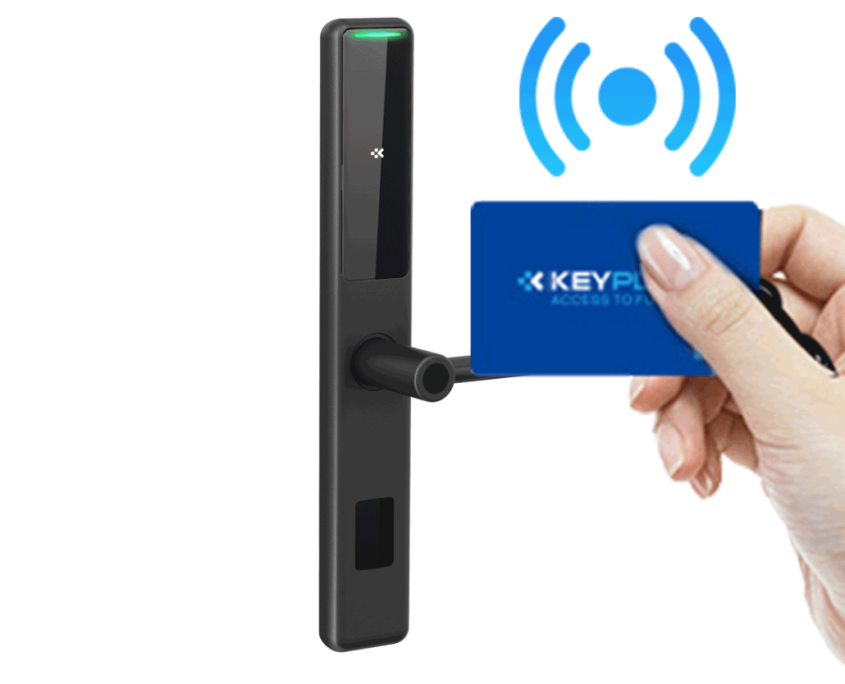RFID Locks: A Full Guide
In today’s fast-paced world, security and convenience are top priorities for homeowners and businesses alike. Traditional locks and keys are slowly being replaced by advanced access control systems, and one of the most popular options is RFID locks.
RFID (Radio-Frequency Identification) technology has revolutionized how we secure our homes, offices, and even hotels. But what exactly are RFID locks, how do they work, and why should you consider them?
This comprehensive guide will cover everything you need to know about RFID locks, including their benefits, types, installation, and potential drawbacks. By the end, you’ll have a clear understanding of whether an RFID lock is the right choice for your security needs.
What Are RFID Locks?
RFID locks are keyless entry systems that use radio waves to communicate between an RFID card, fob, or smartphone and the lock itself. Instead of inserting a physical key, you simply hold your RFID-enabled device near the lock, and it unlocks automatically.
These locks are commonly used in:
- Homes (smart locks for front doors, garages, and gates)
- Hotels (keycard entry systems)
- Offices & Businesses (access control for employees)
- Gyms & Storage Units (secure, automated entry)
How Do RFID Locks Work?
RFID locks operate using electromagnetic fields to transfer data between the lock and the RFID tag (card, key fob, or smartphone). Here’s a simple breakdown:
- RFID Tag Activation – When you bring an RFID card or fob close to the reader, the lock’s electromagnetic field powers the tag.
- Data Transmission – The tag sends a unique encrypted code to the lock’s reader.
- Authentication – The lock checks if the code matches an authorized user.
- Access Granted – If verified, the lock disengages, allowing entry.
Unlike traditional keys, RFID locks can be easily reprogrammed, and access can be revoked remotely if a card is lost or stolen.
Types of RFID Locks
There are several types of RFID locks available, each suited for different security needs.
1. RFID Card Locks
- Commonly used in hotels and offices.
- Employees or guests receive a programmed card for entry.
- Easy to deactivate if lost.
2. RFID Key Fob Locks
- Small, portable fobs (like car key fobs).
- Popular for residential smart locks and gym memberships.
- More durable than cards.
3. Smartphone-Enabled RFID Locks
- Uses Bluetooth or NFC (Near Field Communication).
- Unlock doors via an app (e.g., August Smart Lock, Schlage Encode).
- Allows remote access and guest passes.
4. Biometric RFID Locks (Hybrid Systems)
- Combines RFID with fingerprint or facial recognition.
- Used in high-security environments.

Benefits of RFID Locks
1. Keyless Convenience
- No more fumbling for keys—just tap and enter.
- Ideal for people who frequently lose keys.
2. Enhanced Security
- Traditional keys can be copied; RFID tags use encrypted codes.
- Lost cards/fobs can be deactivated instantly.
3. Remote Access & Control
- Many RFID locks integrate with smart home systems (Alexa, Google Home).
- Grant temporary access to guests or service workers via an app.
4. Audit Trail & Access Logs
- Track who enters and exits (useful for businesses).
- Monitor employee attendance or suspicious activity.
5. Durability & Weather Resistance
- No keyholes mean less wear and tear.
- Many models are weatherproof for outdoor use.
Potential Drawbacks of RFID Locks
While RFID locks offer many advantages, they aren’t perfect. Here are some potential downsides:
1. Power Dependency
- Most RFID locks run on batteries (typically lasting 6-12 months).
- Some models have backup keys in case of battery failure.
2. Hacking Risks (Though Rare)
- Sophisticated hackers can clone RFID signals (but this requires close proximity).
- High-security RFID locks use rolling encryption to prevent this.
3. Higher Cost Than Traditional Locks
- Prices range from 100 to500+, depending on features.
- However, the long-term benefits often justify the cost.
4. Compatibility Issues
- Not all RFID locks work with every smart home system.
- Check compatibility before purchasing.
How to Choose the Right RFID Lock
When shopping for an RFID lock, consider the following:
1. Security Level Needed
- Basic RFID locks are fine for homes.
- High-frequency (HF) or ultra-high-frequency (UHF) RFID is better for businesses.
2. Smart Home Integration
- Look for Wi-Fi or Bluetooth connectivity if remote access is important.
3. Battery Life & Backup Options
- Opt for models with low-battery alerts and emergency power options.
4. Installation Type
- Deadbolt RFID locks (for front doors).
- Mortise locks (common in commercial buildings).
- Padlocks (for storage units or lockers).
5. Budget
- Entry-level: 100–200.
- Premium: $300+ .
Installation & Setup
Most residential RFID locks are designed for DIY installation, while commercial systems may require professional setup.
Basic Installation Steps:
- Remove the old lock and measure the door thickness.
- Insert the RFID lock mechanism and secure it.
- Install the keypad/reader and connect wiring (if applicable).
- Pair RFID cards/fobs via the lock’s programming mode.
- Test the lock to ensure smooth operation.
For smartphone-enabled locks, download the companion app and follow setup instructions.
Final Thoughts: Are RFID Locks Worth It?
RFID locks provide a secure, convenient, and modern alternative to traditional keys. They’re ideal for:
- Homeowners who want keyless entry.
- Businesses needing access control.
- Rental properties where key management is a hassle.
While they come at a higher upfront cost, the long-term benefits—enhanced security, remote access, and no more lost keys—make them a worthwhile investment.
If you’re ready to upgrade your security, consider an RFID smart lock and enjoy seamless, key-free access to your property.
FAQs About RFID Locks
Q: Can RFID locks be hacked?
A: While rare, high-tech thieves can clone RFID signals. Choose locks with encryption to minimize risks.
Q: Do RFID locks work during a power outage?
A: Most run on batteries, so they’ll still function. Some have backup keys for emergencies.
Q: Can I use my phone as an RFID key?
A: Yes, if the lock supports NFC or Bluetooth.
Q: How long do RFID lock batteries last?
A: Typically 6–12 months, depending on usage.
Q: Are RFID locks better than fingerprint locks?
A: It depends—fingerprint locks offer higher security, but RFID is more convenient for multiple users.
By now, you should have a solid understanding of RFID locks and how they can improve your security and convenience. Whether for your home, business, or rental property, an RFID lock could be the perfect upgrade for a smarter, safer future.
Would you consider switching to an RFID lock?Please contact us in the message area!









